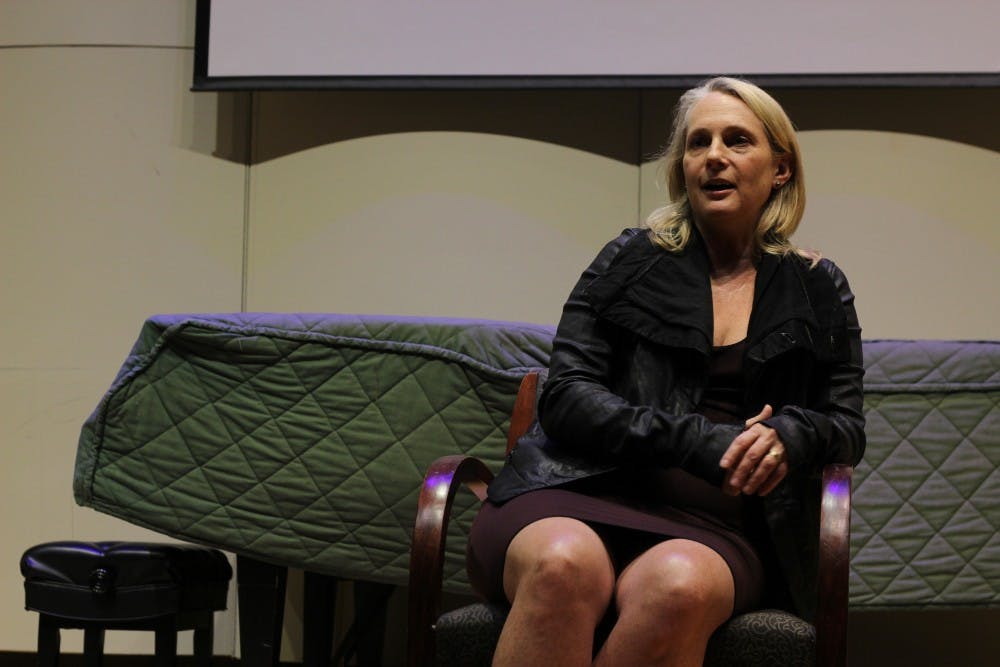The day Piper Kerman left FCI Danbury prison, the guards brought her down to the processing room, handed her the smallest men’s clothing they had, gave her $28 in gratuity and led her out the back door.
By the door of the triangular-shaped, 12-story Chicago prison, her then-boyfriend Larry Smith waited impatiently for her with a plane ticket and women’s clothing, ready to take her home.
Smith had visited Kerman during her 13-month sentence for money laundering and drug trafficking and written to her — two of the most important things, Kerman explained, for those in prison.
“The visiting room is the most important room in a prison,” she said. “And if that’s the most important room, then mail call is the most important time of the day. A card, a letter, a postcard, even a magazine — it’s some signal, some sign, that you haven’t been forgotten by the outside world.”
Kerman shared this and other firsthand experiences of serving time Sept. 30 to a sold-out McCrary Theatre. She also addressed prison reform and touched on the themes of prison life that she wove into the book and Netflix original series “Orange is the New Black.”
Prison reform in the United States
As someone who experienced the U.S. prison and criminal justice systems, Kerman laid out the exact reforms she said are needed to reduce the prison population, to keep people out of prison and to help them re-integrate back into society.
The biggest reforms Kerman discussed revolved around jail and court reform. She pointed to states such as New York, New Jersey and South Carolina, which have all taken measures to implement these reforms and have seen a decrease in crime as a result.

“States that have reduced their prison populations are safer,” she stressed several times throughout the speech.
According to Kerman, the public defense system is also flawed. About 80 percent of all defendants are too poor to afford an attorney — and most attorneys take on about 400 cases each year. In addition, the federal government does not pay for these attorneys. It is technically the job of state governments, who then pass on the cost to counties. As a result, counties pay relatively low fees for the defense lawyers and put a cap on how much they can make.
“You can see how that robs that defendant of their rights, whether they are guilty or not,” Kerman said.
Kerman advocated for a third solution — an overhaul of the juvenile detention system in the United States. Studies have shown that children in this system are more likely to end up back in prison than those who repay the community for their actions through alternative methods. Children should not be sentenced to an adult prison.
“Stop putting kids in adult prisons,” she said. “Prison is no place for a child. I don’t care what they did. It’s not a place for 18 to 25-year-olds, the riskier age group.”
She also applauded a piece of legislation currently in Congress that would significantly help prisoners re-entering society.
The Fair Chance Act would reduce the barriers former offenders face when applying for jobs with the government. According to Kerman, 18 states already have laws similar to the act in place. For instance, in Ohio, where Kerman currently lives, federal employers cannot ask candidates for their criminal history until they are about to be offered the job.
“The legislation is there,” she said. “It just needs to be reintroduced and put on Obama’s desk.”
‘Orange is the New Black’
Kerman also spent time talking about the conditions of prisons, the women with whom she did time, the rules and rituals that come out in the book and the show and the dehumanizing and marginalizing prison system in the United States.
But when she chose to write about her experiences, she wanted to write about them in a way that would entice a particular audience.
“I wanted to leave people with a different idea of who is in prison,” Kerman said. “I wanted people to read about prison who wouldn’t think to pick up a book about prison.”
Kerman touched on the common themes she found that define the prison system and the life within it: race and class; gender and power; and friendship and empathy. These themes are all central to her book and can be found layered over each other in the show, “Orange is the New Black.”
“It’s no secret that the criminal justice system has played a significant role in maintaining racial hierarchy in this country,” she said. “It was used to enforce [Jim Crow] laws, and is still being used as a tool of control over the community, especially over African Americans.”
She explained the power structures work within women’s prisons in particular, and how guards and correctional officers tend to be male — which leads to sexual assault and abuse within the prisons.
The United States has investigated some of these prisons where sexual abuse was rampant, like the Otter Creek Correctional Facility in Kentucky. In the case of Otter Creek, Kerman explained, neither the state nor the company knew how to address the sexual abuse, so they moved the prisoners instead. The facility has been closed since August 2012.

“Most women and girls that are in prison are the survivors of sexual or physical abuse,” Kerman said. “Women and girls in the system suffer from higher rates of substance abuse and mental illness than men.”
Friendship helped Kerman survive her time in prison. Without it, prison would have been a lonelier and much more somber place to be.
Empathy is what helped her keep connected to the outside world.
“It’s what’s needed to bring home nearly 700,000 people from prison and jail every year,” she said. “Not all of them have a Larry to make their journey home a safe one.”
Senior Reporter Lucia Jervis contributed reporting.


